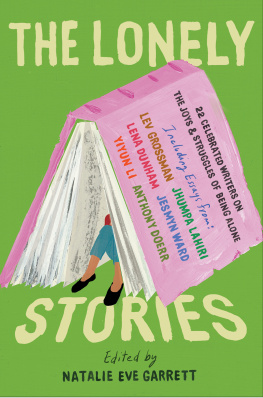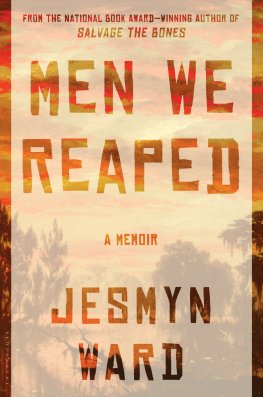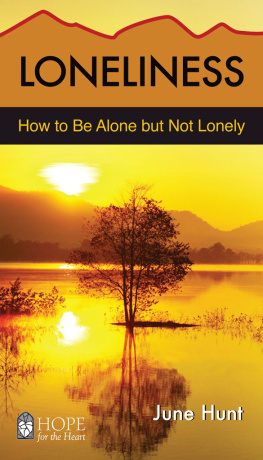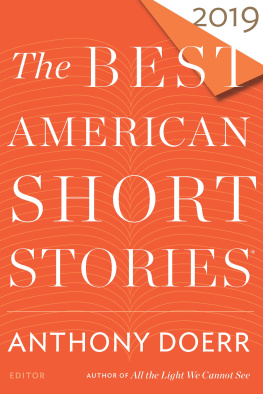Table of Contents
Guide
Page List

ALSO EDITED BY NATALIE EVE GARRETT
Eat Joy:
Stories & Comfort Food from 31 Celebrated Writers
The Artists and Writers Cookbook:
A Collection of Stories with Recipes

For Tony, Serafina, and Aurelio
Contents
What if we joined our sorrows, Im saying. Im saying: What if that is joy?
ROSS GAY , The Book of Delights
While working on this book, I held that quote in my mind, but with a twist: What if we joined our loneliness? What if that is joy?
With The Lonely Stories, I hoped to summon cathartic personal essays illuminating the experience of being alonestories of our solitude and stories of our loneliness. Because although talking about loneliness often seems taboo, even a source of shame, we all feel it sometimes: when were adrift in a new and unfamiliar place; while searching for a partner or feeling disconnected in a relationship; in the isolating experience of being misunderstood, undervalued, or disrespected; when seeking kindred spirits and community; when navigating online and in-person experiences; and during passages of life including heartbreak, illness, and grief. Joyful stories of aloneness were also welcome, because even though we all experience the sting of loneliness, so often we feel replenished by solitude.
I wanted The Lonely Stories to offer readers a range of entry points, with essays touching on topics including aloneness and gender, sexuality, addiction, immigration, insecurity, and illnessachingly relatable essays, regardless of life experience. More women than men responded to my invitation, so this book encompasses more of their perspectives. Our society tends to expect women to hold everything and everyone together, socially and emotionally; women who relish being alone are the witches, the misfits. So it felt right to make more room for women to examine and honor the shape of their aloneness.
The book began before the pandemic. While much of it was written during the long days of quarantineprivate memories of aloneness, poignantly drafted during our collective alonenessthe majority of the essays reflect not on the pandemic but on earlier times. For me, in the wake of living through such an intense period of isolation, the premise of the book resonates even more strongly, and the healing it offers feels even more necessary.
While putting together The Lonely Stories, I was drawn to essays about the quiet delights of solitude and the shocks of isolation, as well as reflections on the gentler waves of loneliness that come and go throughout our lives. I longed to create a harbor for our most vulnerable stories, told with urgency and sometimes with levityaffirming stories that might reassure and reconnect us. Most of all, I hoped to shine light on a universal emotion and experience that is often pushed down into the dark.
Throughout my life, Ive experienced the pain of loneliness, yet Ive also come to cherish solitude. When I was growing up, I used to imagine that all of the past versions of me were still everywhere Id ever been. It was a bit like believing in ghosts and a bit like having imaginary friends, but they were just younger versions of me. Id spend an afternoon romping through the woods alone; at night, lying in bed, Id picture myself out there, eyes shining in the dark. Part of me genuinely believed that I was still out there, or that days version of me was, and that all the other versions of me that had ever romped in the woods were out there, too. As an introspective, creative, and also frequently sick kid, I found this vision both slightly unsettling and profoundly reassuring: no matter what happened, Id always be there for myself.
Episodes of prescribed solitude were a constant throughout my childhood, precipitated by chronic sinus infections, undiagnosed migraines, waves of unrecognized anxiety, chronic fatigue before it had a name. In my elementary school class, I was the one who was always sick, although I felt ashamed when classmates would say, Youre always sick, as if to suggest that I was never really sick but instead secretly wanted to spend days home alone in bed, my hands pressed against my temples and around my eyes, pushing back to counter the stabs of pain within. Overall, I was fortunate: my afflictions were neither severe nor life threatening; I had two caring parents with good health insurance; my mom could afford to take time off of work to shuttle me to dozens of doctors and help me recover from two regrettable sinus surgeries. Nevertheless, there was no magic cure. Sometimes the only way out is through.
So I waited it out, in the dark, alone. When my head throbbed, there was nothing to do but lie in bed and rest; noise and light just made it worse. My imaginativeness was in part a product of all of this alone time, but it was also a balm for it: it was hard to be deeply lonely when surrounded by the hazy echoes of my former selves.
Now in my forties, with children of my own, I still get those migrainesin fact, they come with greater frequency. Reclusive recuperation, though, is harder to come by. Instead, I often find two sweet children jumping on me as I lie on the sofa with a compress over my eyes: Do you need a hug, Mommy? In times like these, when Im struggling to hold on, I sometimes find myself flung back to memories of my childrens even-younger selvesthe downy ringlets and squeakier voices, the way my daughter said pleps instead of please and my son hoisted himself upright by hugging my leg. Every once in a while, I catch a glimpse of my former self in them, too, or spot a shadow of myself out the window, scrambling over fallen trees in the woods, calling me back to me. These glimpses of the girl I once was, and in a sense, still amwide-eyed, fragile, unsure, and bravemake me feel less lonely. Every once in a while, I just need that reminder: Im still here.
The desire to hold on to fleeting feelings and experiences is part of what propelled me toward my love of painting and writing and, ultimately, toward the dream of conjuring this book. And while loneliness can be devastating, I find it deeply moving that it can also function as a portal to beauty and discovery.
In The Lonely Stories: 22 Celebrated Writers on the Joys & Struggles of Being Alone, Imani Perry confronts chronic illness, while Aja Gabel offers a meditation on miscarriage and hope. Jean Kwok grapples with the particular loneliness of being an immigrant, twice. Jeffery Renard Allen delves into his childhood fear of losing his mother, a single mom raising him on the South Side of Chicago. Jhumpa Lahiri reveals the ways in which books have offered consolation in lonely times. Anthony Doerr shares his comedic struggles with internet addiction. Lidia Yuknavitch sensuously revels in solitude.
The writers in The Lonely Stories are at turns tentatively dipping into solitude, struggling not to sink into isolation, and enriched by self-discovery. By sharing their heartfelt stories, were reminded that were not alone in feeling alone. Maybe that helps alleviate some of our loneliness; maybe it reminds us to handle our aloneness with tenderness.
If youre feeling lonely or if youve ever felt unseen, if youre emboldened by solitude or secretly longing for it: welcome.
















